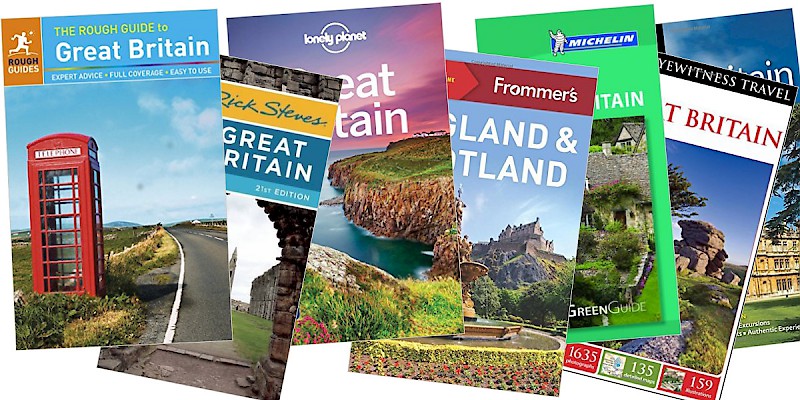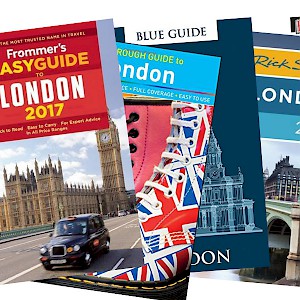U.K. guidebooks

Everything you always wanted to know about travel guidebooks by a professional travel writer who spent two decades writing them
Your guidebook is a $20 investment for your $3,000 trip.
It is one of your closest travel allies, your pocket-sized friend with all the answers and the best insider's advice—and I felt this way even before I started writing the things.
Your guidebook is the one item in your pack that can tell you which bus will go to the castle outside town, which hidden pub has the best grub, and which hotels accept Visa or give discounts to families.
It can provide the background on that sculpture in the cathedral, instructions for using the local subway, and exact prices for triple rooms and fixed-price menus to help you watch that travel budget.
It will direct you to the best shopping, the hottest discos, and the museums most worth your time and money.
People who travel without guidebooks usually regret it and end up buying one on the road (which, with the exception of any locally-produced guides, will be imported and hence far more expensive).
Recommended U.K. travel guidebooks
You should travel with the books that best suit your own tastes, budget, and interests. For the record, here are some of the ones I would take and why ("H&R" means "hotel and restaurant"):
- DK Eyewitness Travel Guide: Great Britain
For the visually inclined
Tons of pictures, maps, and cutaway floor plans; good, broad coverage; perfect for at-a-glance picking places and sights to visit; H&R uninspired—mostly already known mid- and upscale choices. Disclosure: I've written for them. - The Rough Guide to Great Britain
Your erudite buddy with advice
Good practical and background/historical info and cultural context; excellent destination coverage; succinct hotel and restaurant reviews in multiple price ranges. - Frommer's England and Scotland
Your reliable friend who over-researches everything
In-depth coverage on all major destinations and sights; good practical info; the most detailed H&R reviews. Disclosure: I've written for them. - Lonely Planet Great Britain
The backpacker whose been everywhere
Similar to Rough Guides, with perhaps a few more smaller, in-between destinations covered, but with less historical and cultural background; can't seem to decide if it's still aimed at backpackers, as it long was, or mid-scale readers. - Michelin Green Guide Great Britain
The academic whose brother is a restaurant critic
Good overview of destinations and their major sights and attractions—presented, oddly, in alphabetical order—heavy on the historical and cultural detail; decent but cursory practical info and H&R—though the H&R selections are among the best, thanks to its famous sibling series, tne Michelin Red Guides. - Rick Steves Great Britain
The bus tour that skips the bus for local transit and mom-and-pop properties
More a classic D.I.Y. tour itinerary than a comprehensive guide, but perfect for hitting the highlights plus a few "backdoors," with spot-on advice; folksy style; limited, but well-chosen, H&R; limited background info. - DK Eyewitness Back Roads Great Britain
Great driving tours
Well-illustrated; light on detail, but perfect for itineraries. - Frommer's EasyGuide to London
The best London guide on the market
Great background and practical info; inspired H&R choices; focus on experiences. When I took in-laws to London, we had five guidebooks but all fought over getting to use this one. Disclosure: The author is a personal friend and former co-worker—but I'd recommend this book even if I hated him. - Blue Guide London: 18th edition
The professor
If you want to know the provenance of every painting in the museum and altarpiece in the church, this is your book; a surfeit of historical context; very limited practical info and H&R.
Tips
With so many series and specialty books, the travel shelf can be a confusing place; it's hard to tell which book may be right for you.
Make sure you choose a guidebook that fits your personality, budget, and travel style.
Guides that cover, say, all of Europe are great for planning and for whirlwind vacations, but for more focused trips you may also want a country, regional, or city guide.
Leaf through many; buy the guides you like.
Each of the many travel guidebook series out there caters to a specific audience:
- Middle-class adults and families (Frommer's, Rick Steves, Time Out)
- Budget travelers & backpackers (Let's Go, Lonely Planet, Rough Guide)
- General or upscale travelers (DK Eyewitness, Fodor's)
For first-time travelers-or for those traveling for the first time to a new destination—I recommend a one-two punch of Rick Steves and Rough Guides.
This provide the perfect combo of solid travel philosophy, good guidance on where to spend your precious vacation days, and the background and cultural context to make all those sights and museums come to life.
It's hard to beat Frommer's EasyGuide to London. If you have to bring just one book (and aren't venturing too far beyond London), this is it.
The main rule when shopping around for one of these handy dandy travel companions is: do not skimp.
Buy two or three.
Get books that balance each other out. One may have great hotels and restaurants, another is packed with background and historical info for sightseeing, a third has all sorts of fun recommendations for things to see and do beyond the touristy stuff.
One mistake I see many people making in the bookstores—and I hang around the travel section an unhealthy amount —is buying a guide based on the cover price.
Chances are, you're banking a trip worth several thousand dollars and a lot of happiness on the information in two or three books, so you want to get the best advice possible.
Don't even look at the price when choosing a guide. I'll tell you right now: the most expensive books are the $30, visually oriented books on glossy paper with lots of pictures.
Most hover around $15 to $25—that's peanuts to your vacation expense account.
Two or three high-quality guides are the best vacation investment you can make, and they will pay for themselves a hundred times over.
One of my favorite letters from a reader thanked me for saving them $450 in plane fares and car rental fees just with the advice in the book's planning chapter.
Keep in mind that guidebooks take around six months or longer to research and write, plus another six months to go through the editorial, printing, and distribution to your local book store processes.
That means the information in those pages is probably at least a year old.
In the interim, things will have changed somewhat.
Restaurants do sometimes close down, hotels always raise their prices, the tourist office may have decided to move across town, some great new museum may have opened, and bus schedules will undoubtedly have changed.
Furthermore, since the book stays on the shelf for at minimum one year (often two years, sometimes even three), that means the info in the copy you pick up may be getting very old indeed.
The copyright date printed on the page with all that fine print near the very front of the book (in British-published books, sometimes it's at the back), is a good guide, but it only tells you which year (in rare cases down to the month) the book actually hit the store shelves. Keep in mind that the book ha to be researched, written, edited, and printed before that, so all the information is likely at least several months old even when the book is brand-new.
So cut your guide a little bit of slack when its info proves a little stale, and please stop insisting to hotel owners that they are somehow law-bound to charge the rates printed in your dog-eared 1996 edition of Let's Go (hoteliers complain about this to me all the time).
In the end, even if all prices are $2 to $20 higher than the book states, for the most part they'll still be relatively on the mark.
The budget hotels will still be the cheapest, and the luxury ones will be the splurges. Though, again, sometimes a run-down one-star flophouse will, between the research phase and the time you buy the book, have acquired new owners and been renovated into a mid-scale three-star inn. These things happen.
I solve this problem by making one last run to the bookstore travel section just before leaving on a trip, hoping to find a brand-new edition of each of the books I've already bought for my trip (happens more often than you'd think).
If there is a new one, I bite the bullet, spend the extra $20, buy the new edition and toss the old one—even if I had bought that older edition just a few weeks before.
Remember, this is an investment in a tool that has the potential to save you hundreds of dollars on your trip. Twenty bucks is chicken scratch.
I always get several guides to each destination, then ruthlessly rip them up and staple together related sections—say, every book's chapter on Oxford—to make my own Frankensteinian guide to each city. This is what I stick in my daypack to carry around town, rather than lugging about a stack of massive books.
When I leave town, I either keep the sections as souvenirs, pass them along to a new arrival, or toss them onto the exchange bookshelf at the hotel.
Share the love, baby. Share the love.
People always ask me what guides I travel with. That's irrelevant (though, to be fair, I listed some faves up above).
You should always pick the guide that best suits your own tastes, travel needs, and interests.
I'm a fan a family-run restaurants and pubs, modest little hotels and B&Bs with funky charm, learning all about the history and art and cultural context, and getting to know the locals wherever I go. (I also ain't rich, so that dovetails nicely with my personal travel philosophy.) These tastes inform my choice of guidebooks.
Though as a journalist I've covered more than my share of upscale restaurants and five-star hotels, they really aren't my cup of tea (nor are they in my price range), so for personal trips I don't ever bother with, say, a Fodor's guide.
At the same time, I'm not a fan of hostels, nor of hanging out with students bent solely on partying their way through Europe, so I have little personal use for Let's Go and its ilk.
There's nothing wrong with the student-oriented guides in of themselves—or the students for that matter. I'm just not intersted in partying with the ones who'd rather stay back at the hostel's pub getting drunk and hooking up with fellow travelers than head out to explore some residential neighborhood. I'm just saying the books aren't for me.
Pick the guidebooks that are right for you.
Yes, I used to be a full-time guidebook author. However, no longer.
- Except on rare occasions, since 2005 I no longer write print travel guides; just my websites.
- Even when I did write guidebooks, I never received a single penny in royalties on any of my books—"royalties" are the percentage of each sale that an author would normally receive in most parts of the publishing industry; however, that is not how most guidebook publishers operate these days.







